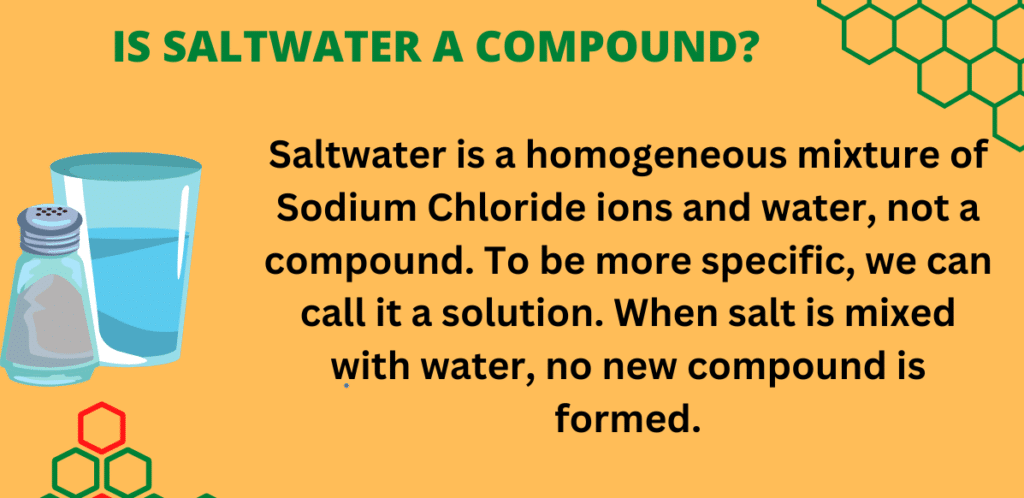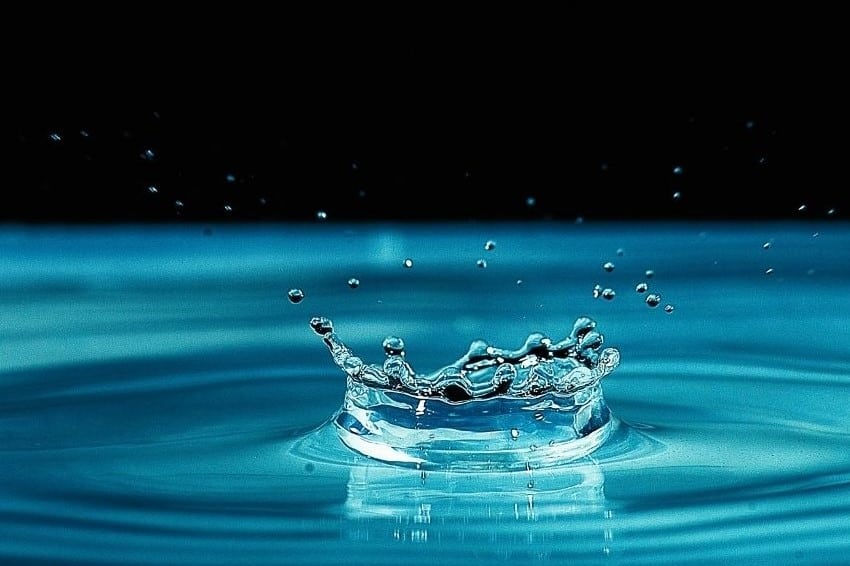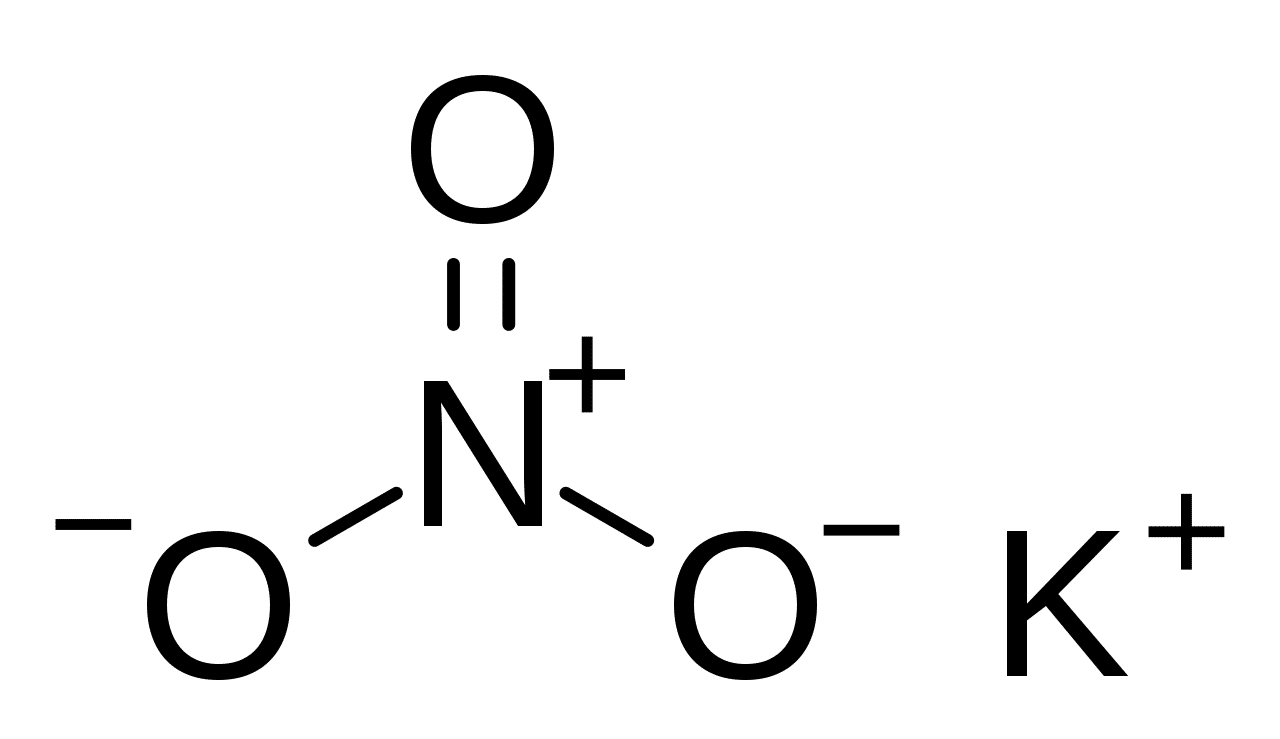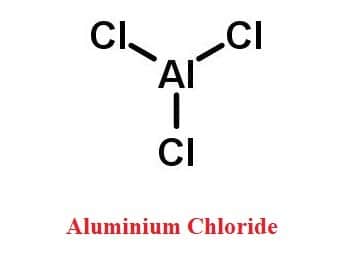No, saltwater is not a compound. Saltwater is a mixture of water and dissolved salt ions, such as sodium chloride (NaCl) and potassium chloride (KCl). A compound is a substance composed of two or more different elements chemically bonded together in a fixed ratio. Saltwater does not fit this definition as it is a mixture of two substances, not a chemical compound.

Table of Contents
Characteristics of Saltwater
- Density: Saltwater is denser than freshwater due to the presence of dissolved salt ions. This increased density affects buoyancy and can impact aquatic life.
- Boiling Point: Saltwater has a higher boiling point than freshwater due to the presence of salt ions. This can impact processes such as desalination.
- Freezing Point: Saltwater has a lower freezing point than freshwater due to the presence of salt ions. This property is used in the prevention of ice formation in cold weather by adding salt to roads and sidewalks.
- Conductivity: Saltwater is a good conductor of electricity due to the presence of salt ions, which are free to move and carry an electric charge. This property is used in electrochemistry, such as in batteries and electroplating.
- Corrosion: Saltwater is more corrosive than freshwater due to the presence of salt ions, which can react with metal surfaces and cause rust and decay. This can impact marine structures such as ships and piers.
- Taste: Saltwater is not suitable for drinking due to its high salt content, which can lead to dehydration and other health problems.
Why Is Saltwater a Solution?
A solution can be in the form of a gas, liquid, or solid and can contain more than one solute that dissolves in a solvent. The solvent constitutes the vast majority of the mixture. The solute(s) and the solvent combine to form a homogeneous mixture of microscopic particles. Furthermore, a solution can be physically altered but not chemically transformed.
For the following reasons, saltwater meets the criteria for a solution:
- Saltwater is a substance made up of uniformly or homogeneously distributed high concentrations of dissolved salt in water.
- It is possible to separate or separate compounds from saltwater.
What are Mixtures?
A mixture is what is produced when two or more pure substances are combined. Mixtures can always be broken down again into their individual pure components because there is no atom-to-atom bonding between the atoms of the constituent substances in a mixture. Despite the fact that a compound’s properties may be very dissimilar from those of its component parts, substances in mixtures still retain their distinctive properties.
For example, a salt solution in water (salt water) is considered a mixture because it is composed of salt and water. The constituents of the salt solution have no fixed ratio, and the properties of the mixture are determined by the nature of its components. Salt solution components can be separated.
Furthermore, since the dissolved salt is evenly distributed throughout the saltwater sample, the saltwater described above is homogeneous. A homogeneous mixture is one in which the composition is consistent throughout.
Frequently Asked Questions
| No. | Question | Answer |
| 1. | Is saltwater considered a compound or a mixture? | Saltwater is considered a mixture of water and salt ions. |
| 2. | What is the difference between a compound and a mixture? | A compound is a substance composed of two or more different elements chemically bonded together, while a mixture is a combination of two or more substances that are not chemically bonded. |
| 3. | Can a compound be separated into its individual components? | Yes, a compound can be separated into its individual components through chemical reactions. |
| 4. | What are some of the main components of salt water? | The main components of saltwater are water and dissolved salt ions, such as sodium chloride and potassium chloride. |
| 5. | What is the chemical formula for salt? | The chemical formula for salt is NaCl (sodium chloride). |
| 6. | Can saltwater be purified and made safe for drinking? | Yes, saltwater can be purified through desalination processes to make it safe for drinking. |
| 7. | What are some of the properties of saltwater? | Some properties of saltwater include density, boiling and freezing points, conductivity, and taste. |
| 8. | How does the presence of salt affect the boiling and freezing points of water? | Salt lowers the freezing point of water and raises the boiling point of water. |
| 9. | Why is saltwater more corrosive than freshwater? | Saltwater is more corrosive than freshwater due to the presence of salt ions, which can react with metal surfaces and cause rust and decay. |
| 10. | What are some of the environmental impacts of saltwater, and how are they being addressed? | Environmental impacts of saltwater include soil salinization, changes in aquatic ecosystems, and impacts on agriculture. These are being addressed through management and conservation efforts. |
11. Does salt water absorb moisture?
Water is absorbed by salts. Because salt compounds and water are polar in nature, their attraction is quite strong. Hygroscopic salts are those that can absorb water.
12. What is the sugar and water mixture called?
The sugar water solution is a homogeneous mixture because the two substances completely combine to form one liquid with the same texture and appearance throughout.
13. What is hydrolysis for example?
Hydrolysis is a chemical decomposition process that involves the splitting of a bond by the addition of water. For example, food enters your body in the form of polymers that are far too large for your cells to use, so they must be broken down into smaller monomers.
14. Why is the pH of seawater 8?
The pH of seawater ranges from 7.5 to 8.4. This is due, among other things, to the fact that the majority of the dissolved minerals picked up by groundwater and eventually carried to the ocean are pH increases.
15. Is the pH of NaCl always 7?
Sodium chloride is a neutral salt formed by neutralising hydrochloric acid and sodium hydroxide. Sodium chloride has a pH of 7.
16. What is the difference between mass and density?
The difference between mass and density is that mass refers to the total amount of matter in any object, whereas ‘density’ refers to the total mass of any object in relation to its volume. The density of any object is calculated by dividing its mass by its total volume.
More Links
- BCl3 Lewis Structure in four simple steps - November 1, 2023
- PH3 Lewis Structure in four simple steps - October 8, 2023
- PF3 Lewis structure in four simple steps - September 24, 2023



